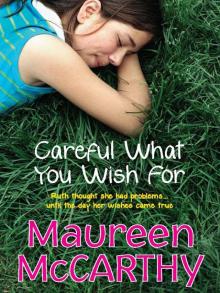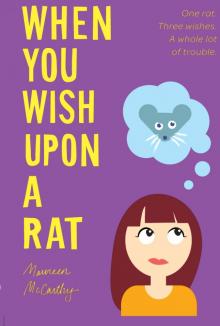- Home
- Maureen McCarthy
The Convent Page 16
The Convent Read online
Page 16
‘No one will see us, Mother.’
The Reverend Mother opened her mouth but nothing came out.
Breda went on excitedly. ‘It would be exercise, Mother.’
‘Exercise?’
‘Exercise is good for our health, Mother.’
‘Is it now?’ Mother smiled. ‘And have you spoken to your Novice Mistress about this?’
‘No, Mother.’ Breda hesitated and then grinned. ‘We thought we’d have more luck with you!’
The other novices held their breath. Playing one of their superiors off against another would surely go against their cause. But Mother Superior seemed not to have heard. If she had, she pretended otherwise.
‘Well,’ she sighed, shaking her head as though in exasperation. ‘I really don’t see why not. As you say, it’s exercise and a little enjoyment for you.’
‘Oh thank you, Mother!’ they chorused. ‘Thank you.’
‘With the exception of Lent, of course, or any other …’ ‘Of course, Mother.’
The Provincial stood up. Her tall, angular frame was elegant in all the heavy robes. ‘Besides, tennis might use up a little of the energy that was on display this morning.’
‘Yes, Mother.’ The novices tried to look ashamed, but they all noted that Mother’s eyes were twinkling.
‘Believe it or not, we were all young once,’ she said suddenly. ‘I remember being caught in a fit of giggling that had me going without supper for a week!’
They stared at her dumbfounded, trying to imagine it.
‘Really, Mother?’
‘Oh yes!’ She was laughing. ‘Good evening, and God bless you, my dears.’
‘Good evening and God bless you, Mother.’
So every Saturday afternoon for an hour, except in Lent or on Holy Days, they would play tennis. The novices and postulants running around the court in their black lace-up shoes, voluminous skirts and veils, falling over, laughing and yelling as they tried to hit the ball over the frayed net, taking it in turns to join the onlookers on the sidelines, who would call out encouragement and keep a tally of the scores.
But now the bell rang and the Great Silence descended.
‘Ask and you shall receive,’ Breda whispered to Cecilia as they made their way to chapel behind the other sisters.
Breda now lived in a little house in North Fitzroy, right near the Merri Creek, in walking distance of St Georges Road. Inside, the house was as small and quirky as its owner. There were three bedrooms and a bathroom off a central hallway.
‘The man of the house is out on business,’ Breda said wryly, pointing at one half-open door. Cecilia grinned at the unmitigated adolescent mess.
She was shown into the bedroom opposite, a small, simply furnished room with an old wood-framed window looking out onto the street. She dumped her luggage and they made their way down to the kitchen.
The back of the house was lovely. It had been renovated into a light-filled kitchen and dining area leading onto a lounge with a built-in computer space and bookshelves along one wall. Glass doors led out onto a small back garden.
‘You hungry?’
‘I could eat something,’ Cecilia admitted.
Breda pulled out cheese and bread and sliced a tomato and poured them both a wine. ‘I’ll let you sleep after this.’
‘This is so nice, Breda. I can’t tell you. I’m so grateful.’
‘Be not grateful but be glad.’ Breda laughed. ‘I’m so glad you’re here.’
‘Oh Breda. So am I.’
‘Did you sleep on the plane?’
‘I never sleep on planes.’ She was buzzing with excitement as well as exhaustion.
‘So you’ll go see your mum?’ Breda asked, after they’d had a drink and a snack.
Cecilia nodded.
‘You said you haven’t had anything to do with her for years?’
‘Nothing,’ Cecilia said without emotion. ‘I … I can’t explain it. I hardly know why myself.’
‘The brothers?’
‘Nothing.’ She looked at Breda, but there was no sign of judgement or shock.
‘It’s good you’ve come, then,’ was all she said.
‘What if she’s dead?’ Cecilia bit her lip.
‘She’s not,’ Breda said. ‘I made a few inquiries when you said you were coming home.’
‘Is she … Is she still out on the farm?’ How weird. She was asking the whereabouts of her own mother.
‘No. The farm is sold. She’s moved into Castlemaine. Don’t worry, she doesn’t know anything about you coming.’ Breda grinned. ‘I was very discreet in my inquiries. But maybe you should write first … let her know you’re around before you just turn up.’
Cecilia nodded. She didn’t have the energy to ask any more questions.
‘You go have a shower and get into bed,’ Breda ordered. ‘I’ll bring you a drink and one of my little pills for special occasions. We’ll talk in the morning.’
‘Okay,’ Cecilia laughed.
There was such comfort in having someone else take charge and tell her what to do. When Cecilia had cleaned her teeth and showered, Breda came in with a mug of hot cocoa.
‘I always have one of these to help me sleep.’
‘I can’t thank you enough.’
At the door Breda hesitated and turned.
‘And the child?’ she said quietly. ‘Will you make contact with … the child?’
So Breda knew. But how?
Cecilia shrugged.
‘Well, good night then. Sleep tight.’
‘I will.’
Some time later Cecilia woke with a start, her heart galloping. Where am I? Then it came to her and the panic slowly abated. But in its place dread loomed. She’d been having the same dream that had plagued her night after night during the last winter in London. Oh the relief when it wore itself out and other dreams took over. Now it was back, the same and yet always so raw and fresh.
It started off so realistically. Here she is again on her first day in the convent, standing in the dormitory inside the calico curtain, feeling nervous, trying to work out what to do first. The Mistress of Novices has told them that they have ten minutes to wash themselves and change into the new clothes lying on their beds. Then they are to walk in silence down to the chapel. Cecilia isn’t quite sure where the chapel is, and she isn’t sure if she is to wash just her face and hands or … Warm water, a thin towel and washcloth have been left for her.
And so she climbs out of her street clothes and stands semi-naked, rubbing at herself, washing away the world and her former life. She puts on the ugly plain underpants, the cotton bodice thing, the petticoat and the black dress, the cape and the small veil with pleasure. Then, just as she is fitting the leather belt and cross around her waist it comes to her: I’ve lost the baby.
She pulls aside the curtains and runs down the long corridor towards the door screaming, My baby! My baby!
The other novices are filing out, backs to her, heads bowed. She screams for them to stop and wait, that they all must help her find her baby. But they don’t turn around. One by one they disappear out the door. It slams shut, the heavy bolts slide into place, and she realises that she has been left behind, alone in the dormitory with no baby. She runs for the door and beats her fists on the wood. Don’t leave me. Please don’t leave me.
Cecilia looked at the little clock on Breda’s side table. How amazing. She’d been asleep for six hours and it had felt like ten minutes. She lay in the dark thinking about the dream … and her baby.
1980
One more hurdle and it would be over. Over. Cecilia sat back in her chair and closed her eyes. She’d had enough! Enough of questions, and red tape, and people who knew best. She’d had enough of strangers, with their anxious looks and clichés. She’d had enough of ‘working through the issues’ and ‘letting go of the grief ’. Where did these people get off? If they bothered to read a good book, go to a concert or to the art gallery once in a while, they might realise that the t
edious language they used had the opposite effect to what was intended. It made her want to run a thousand miles.
Why did she have to explain herself over and over again? She was perfectly sane, a thirty-six-year-old woman with a university education.
In a few weeks she’d be in London. She’d have a couple of weeks catching up with people and then it was over to Paris – forever, if she could wrangle a work visa out of someone. A whole new life was out there and she couldn’t wait.
The door opened quietly and a nurse came in carrying the swaddled infant in her arms.
Cecilia stood quickly.
‘Well, here we are then,’ the nurse said breezily. ‘How are you?’
‘Very well, thank you,’ Cecilia said.
The nurse handed her the baby. ‘I’ll leave you alone a while.’
‘Just as you like.’
‘Why don’t I come back in half an hour?’
‘Okay.’ Cecilia read the name tag on the woman’s chest.‘Thanks, Helen.’
‘A pleasure.’ The nurse smiled. ‘She’s just been fed and changed, so I doubt she’ll wake.’
‘Good.’
‘I’ll see you soon.’
The nurse was almost out of the room when Cecilia thought to ask, ‘Have they come yet?’
‘They’ll be here within the hour.’ The nurse hesitated and turned back. ‘Would you like to meet them?’
‘No no.’ Cecilia shook her head. ‘No, thank you … I just wondered.’
The nurse came a few steps back into the room. ‘They’re very excited,’ she said carefully.
‘Are they?’ Cecilia smiled.
‘Absolutely over the moon. I saw them yesterday.’
‘I’m so glad.’ Cecilia looked down at the tiny, sweet face poking out of the pink blanket. ‘So they’ve got to know her a little?’
‘Oh yes, they have! They adore her. And they’re such lovely people.’
‘Yes.’
‘I think you’ve chosen very wisely.’
Cecilia knew that Helen was probably referring to the parents and not to the larger decision of giving her child away, but she was touched nevertheless. It was one of the very few times during this whole business that anyone had been really positive.
‘Thank you for saying that, Helen,’ she said quietly.
The older woman nodded again before leaving the room.
Lovely people! They damned well ought to be, she’d gone to enough trouble picking them. Cecilia stood up with the baby lying in the crook of her arm, and went over to the window to look out at the big wild grey sky. It looked as if the rain had started already out in the distant Dandenong Hills. During the last three months of her pregnancy she’d gone into the adoption agency for hours at a time, looking at tapes, reading profiles, talking to caseworkers. She wanted to feel one hundred per cent sure and didn’t care how long it took. The process was difficult and often very confusing. Many of the couples wanting to adopt were absolutely right in so many ways, and yet … she hadn’t felt sure. It wasn’t that she wanted highly successful or wealthy people. On the contrary, sometimes when couples wrote about their careers and ‘secure homes and incomes’, she’d shuddered with distaste. Money wasn’t what she was after. Nor were good looks or ‘breezy’ personalities who ‘got things done’ or ‘saw the glass half full’ when times got tough. Those clichéd self-assessments put her teeth on edge.
So she decided to throw away all the criteria and trust her gut instinct. Recognising the true parents of her child would be akin to falling in love. She would know them when they came along.
And they did come along eventually in the persons of Bill and Elizabeth Manning, a Melbourne medical couple in their thirties. Cecilia had liked the look of them immediately and then, when she read the profile and watched the tape they’d made about themselves, she’d felt a simple, profound sense of relief. Yes. Of course she’d had to check references and manage the rest of the red tape, but everything she learnt about them reinforced her initial impression. These were the ones she’d been looking for all along.
For a start, they weren’t as earnest and careful as some of the other applicants. Neither of them considered childlessness a tragedy, only saying that they would think a child or children a wonderful blessing.
Cecilia liked the wry, humorous way they spoke about themselves. He’s bad-tempered in the mornings. She doesn’t know how to cook. Neither of us is very tidy. Yet they were serious people with an outward-looking attitude to life that she liked. They’d both worked overseas with aid agencies. Elizabeth had gone straight into a war zone and worked for two years as soon as she’d finished her medical degree, and her surgeon husband had done similar work in Africa. Both of them did occasional stints in remote Aboriginal communities in Central Australia.
Cecilia liked the man’s heavy, plain features, and all the wrinkles and creases around his dark eyes. His wife was younger and better-looking, with short fair hair and widely spaced cornflower-blue eyes. There was such honesty in her smile and gentleness in her manner. Cecilia found herself imagining her child with this woman. She was warm. She would know instinctively how to hold a baby. She would pick the child up when she needed to be picked up, and she would read stories and make good food. There was something else about her that made Cecilia feel completely confident. This woman knew how to love. There was something wholehearted, even recklessly loving, about her.
The final aspect that won her over was that they were upfront about not having any religious affiliations whatsoever. Most of the other applicants seemed to be churchgoers, or said they were. When Cecilia read agnostic non-churchgoers on the form she offered up a prayer of gratitude – Oh praise be to God! – clapped her hands and laughed aloud. Bill and Elizabeth, you’ll do!
Cecilia was in a private room which looked out over a car park and a small square of green grass with a few straggling trees in the middle. Today there was only one group of people enjoying the grass and the trees. Lots of others crisscrossed around them on their way to somewhere else. Cecilia looked down at the sleeping babe in her arms and marvelled again at the perfection. To think that her own body had produced this lovely living creature! The eyelids fluttered every now and again like soft butterfly wings. Cecilia placed one finger on the soft little cheek and wondered if babies could dream.
‘Goodbye, little one,’ she whispered. ‘May God bless you and keep you safe.’
But although the baby squirmed and yawned a couple of times her eyes remained tightly shut. One tiny fist appeared over the edge of the blanket and Cecilia tentatively put her index finger inside it. When the child’s grip tightened, Cecilia smiled.
Still with her finger inside the baby’s fist, Cecilia stared down at the cars and people and wondered if the couple had arrived yet. Would they have an ordinary car? A Holden, maybe, or a Honda. Perhaps they’d have a fancy European car like a Saab or a BMW. After all, they were both doctors. Whatever it was, they’d have the baby capsule all set up in the back and probably one of those big colourful bags of baby things right next to it. Inside would be a little jumpsuit, maybe, booties, nappies and bottles, and little jars of cream. Elizabeth wouldn’t say much on the way in the car. But every now and again she’d look over at her husband who was driving; maybe she’d put her hand on his knee and they’d smile at each other. Today is the day. Cecilia could almost see them. The day we become parents. She could imagine their anticipation and their joy, just as she felt her own desolation.
It had been hard to recover from the horrible scene she’d had with one of the younger nurses the day after the baby was born. Bits and pieces of their conversation kept playing back in Cecilia’s mind.
The nurse, in her late twenties, had come in to take the usual observations, but there was something odd about her manner. It was as if she was holding something back; her smile was uneasy and she never looked directly at Cecilia. When she finished taking her temperature and blood pressure and began packing everything back onto the trolley
she turned.
‘Do you mind if I ask you something?’ she said, looking at Cecilia directly.
‘Go ahead.’
‘I know it’s none of my business, but why are you giving your child away?’
‘You’re right; it’s none of your business.’
The young woman flinched as though she’d been slapped. ‘Sorry I asked, then,’ she muttered, and then cleared her throat uneasily. ‘Well, I’m done now. If you’re okay?’
Cecilia nodded.
The nurse turned her back and wheeled the trolley towards the door.
The very last thing Cecilia wanted was to continue the conversation, but she couldn’t help herself. ‘I’m sorry I snapped at you,’ she called. ‘The answer to your question is that I don’t want a baby.’
The nurse stopped abruptly by the door. ‘But … you went ahead and had a baby!’ she said.
‘Yes, but the pregnancy was a mistake.’
‘So why did you?’There was a faint note of ridicule under the outrage. ‘I mean, you’re not a kid. You must know … the options.’
‘You’re right. I’m thirty-six.’
‘That’s five years older than me.’
‘Right.’
‘How can you not love her?’
‘Who says I don’t love her?’ Cecilia snapped.
The nurse stared back wonderingly, as though Cecilia was another species.
‘But … if you love her, then …’
‘I’m not married.’
‘But, that man who comes in …’
‘My brother.’
‘Does the father of the baby know about her?’
‘No.’
‘Why not?’
Cecilia stared at the nurse coldly and said nothing. Did this inquisitive stranger seriously expect her to explain her relationship with Peter?
The nurse seemed to read her mind, because her manner was suddenly apologetic. ‘It’s just that my husband and I want a baby so much,’ she said hurriedly. ‘We’d do anything for a baby and … I’m really sorry, but it just seems so unfair that you’ve had a beautiful baby that you don’t want.’

 Careful What You Wish For
Careful What You Wish For When You Wish upon a Rat
When You Wish upon a Rat The Convent
The Convent Queen Kat, Carmel and St Jude Get a Life
Queen Kat, Carmel and St Jude Get a Life Rose by Any Other Name
Rose by Any Other Name